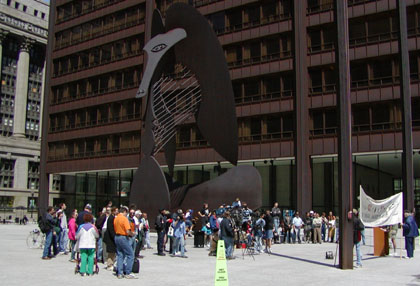 Download PDF of this full issue: v33n2.pdf (12.1 MB) Download PDF of this full issue: v33n2.pdf (12.1 MB) |
Memorial Day in Chicago
By Janet Curry
[Printer-Friendly Version]
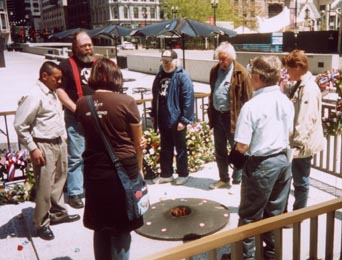
|
Memorial Day speakers
gather at the Eternal Flame (Chicago, 2003)
|
Seven powerful speakers took the podium at the Eternal Flame Memorial on Memorial Day 2003 and locked in the attention of the multigenerational crowd. If, as World War I-era writer Randolph Bourne said, "War is the health of the state," the health of VVAW proved again this day to be the thoroughgoing accuracy of its critical vision and the worldwide embrace of its perspective on what unites so many seemingly diverse struggles, from Colombia to Iraq; from a U.S. Army intelligence analyst seeking conscientious objector status to Gulf War I and II vets, Iraqis and Afghan refugees suffering from U.S. uranium munitions exposure; from nineteenth century women of the Confederacy honoring Union dead to the anti-war activism of John Dos Passos, Henry David Thoreau, Mark Twain, I.F. Stone, and Martin Luther King; from fighter pilots to Army dump truck drivers (you had to be there for this one); and from the late Mayor Harold Washington's full support of vets to Take Back the Night at the UIUC campus to the reclamation of the Vietnam Veterans Memorial Fountain in Chicago -– there was hard-won truth and solidarity for body and soul.
Meg Miner, Gulf War I-era technology sergeant from the Air Force and currently an archivist at Illinois Wesleyan College, began the program with an account from Army Intelligence analyst Diedra Cobb. [Read it on the next page. —Ed.] Cobb levels the searing complaint that vital information was far too hard to come by — even for those, like herself, with top security clearances — for her to form reasonable assessments of the so-called enemy in Gulf War II, so much so that the Army's seven stated values of loyalty, duty, respect, selfless service, honor, integrity, and personal courage lead her now to refuse to participate in this war and in the wider "blind conformity" that allows it to continue. Cobb now pursues conscientious objector status. Miner urged us to make our voices heard, write to public office holders (elected and otherwise), question the motives of TV news "experts," get out the vote and do whatever else we can to break the silence.
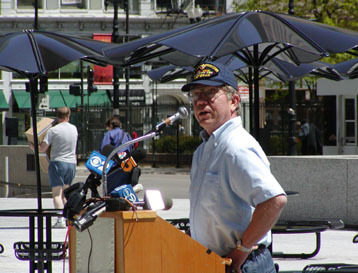
|
Doug Rokke speaks on
Memorial Day (Chicago, 2003)
|
Doug Rokke, Vietnam through Gulf War I vet, Ph.D. in physics and technology education, and now a major in the Reserves, had been assigned to train soldiers in nuclear, biological and chemical warfare response in Gulf War I. Rokke stated that in December 1990, when General Schwarzkopf made the conscious decision to blow up Iraq's chemical and biological weapons capabilities in place, we knew exactly what they had because we gave it to them. Though illegal by U.N. standards, the United States had made a conscious decision to use uranium munitions, and it was this mess that Rokke was ordered by Schwarzkopf to clean up in February 1991. He is still trying. Far from the official total casualty count of 767 U.S. deaths in Gulf I, Rokke reported that casualties were "horrific": over 10,000 dead and over 221,000 on permanent disability according to the Department of Veterans Affairs. As with Agent Orange in Vietnam, radiation casualties continue many years after a war, so these Gulf I numbers will continue to grow. While those with responsibility issued a warning that uranium munitions should not be used again in Gulf II, they were. According to a recent BBC report, Afghan refugees are showing up with uranium poisoning, and since the U.S. Department of Defense has acknowledged in congressional testimony that mandatory pre-deployment physicals were not conducted for Gulf II vets, it becomes more difficult to sort out how to process their care for malaria, respiratory and intestinal problems.
As a warrior, Rokke knows the effectiveness of weapons, but he warned that the technology of war has produced devastation for which we can no longer provide medical care. Like his namesake, General Douglas MacArthur, Rokke stands for duty, honor, and country; but unlike the general, he will never fade away from the "battlefield of political denials" until all vets have the medical care they deserve.
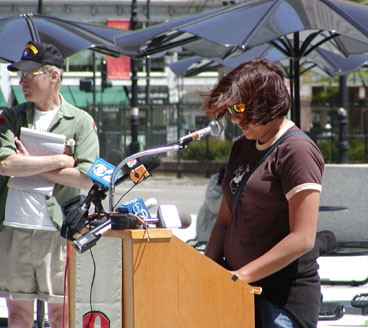
|
Jen Tayabji speaks at
VVAW Memorial Day event (Chicago, 2003)
|
Jen Tayabji, director of the Illinois Disciples Foundation on the University of Illinois Urbana-Champaign campus, also took up the message of casualty rates that far exceed popular media claims. As of this date, over 100 U.S. soldiers are dead, along with 2,500 Iraqi soldiers and 1,250 Iraqi civilians, with thousands more wounded; and this is added to the deaths of 250 adults per day and 5,000 young children per month resulting from U.S. sanctions against the people of Iraq since Gulf I. The $95 billion tab (so far), with the highest deficit in history, is being paid by the Bush administration by slashing education and health care and closing VA hospitals. Fear is widespread during this time, not simply of terrorists abroad, but of the U.S. government as it rounds up immigrants and discriminates against Muslims.
John Zutz, Vietnam vet, VVAW national officer and Milwaukee Chapter member, compared numbers as well. After being AWOL for six days in Vietnam, Zutz was fined $150 and had to make up the six days' work; for another, more privileged AWOL case, this time for a year, the consequence was being made commander in chief. [See this issue's "My View" for yet another consequence for the privileged AWOLer. —Ed.] Citing the original Memorial Day after the Civil War, Zutz called for us to undergo a day of mourning, but with a deep recognition of the loss on both sides.
Luis Aldofo Cardona spoke of the bloody consequences of the United States's Plan Columbia: many thousands dead at the hands of neoliberal policies together with multinationals like Coca-Cola, which is carrying out its own dirty war against its own workers and union members. Collective agreements and benefits once won are now trashed, and thus a boycott of all Coca-Cola products is underway, with the support of high schools, universities, churches and human rights organizations around the world. Cardona asked for our participation.
Filmmaker Denis Mueller recalled the Memorial Day article written by World War II vet and historian Howard Zinn that led to the cancellation of Zinn's column at the Boston Globe in June 1976. What if we celebrated Memorial Day in this country not with the traditional car-crash body count and betrayal of the war dead by hypocritical politicians and war contractors, but looked instead to the tradition of Dos Passos, Thoreau, Twain, Stone and King? That is, we need a different recognition of the day: one with honor.
David Curry, Vietnam vet and secretary/treasurer on the late Mayor Harold Washington's Welcome Home Parade committee, called up the memory of this greatest Chicago mayor. "No one should ever challenge a vet's right to be against war," urged Mayor Washington, who himself had fought in World War II in an engineering battalion in the Pacific, and won, with his unit, the Meritorious Service award.
Paul Wisovaty [Vietnam vet and a regular Veteran columnist; see "Notes From the Boonies" — Ed.] concluded the presentations with the reminder that we can support the troops without supporting reckless wars of imperialism, and the speakers laid VVAW buttons down around the Eternal Flame.
Janet B. Curry is a high school teacher in the St. Louis area and a VVAW extended family member.
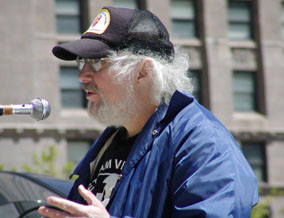
|
Dave Cury at the
VVAW Memorial Day event (Chicago, 2003) |
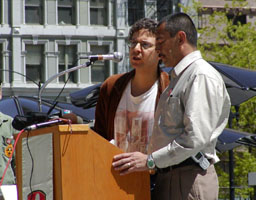
|
Luis Aldofo Cardona on
Memorial Day (Chicago, 2003) |
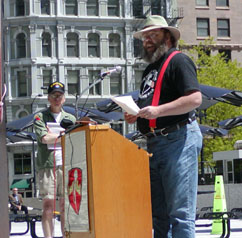
|
John Zutz speaks on
Memorial Day (Chicago, 2003) |
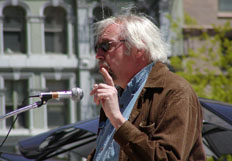
|
Denis Mueller on
Memorial Day (Chicago, 2003) |
|






